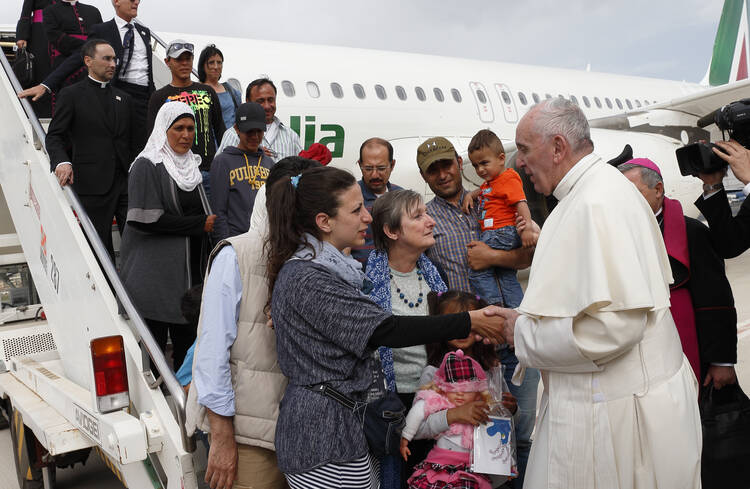Though he turned 80 a couple of weeks ago, Pope Francis did not slow down in 2016:
1. Papal globetrotting continued
His travel schedule wasn’t as grueling as previous years. He left Europe just once, for a February visit to Mexico.
But during a layover in Havana, Francis made history by meeting with Russian Orthodox Patriarch Kirill of Moscow, the first ever encounter between a Roman pontiff and a Russian patriarch.
In Mexico, the pope challenged Christians to avoid the temptations that come along with wealth and power and defended the rights of indigenous communities.
RELATED: More Papal Travel on the Books for 2017
Pope Francis also visited the U.S.-Mexico border, where before celebrating an open air Mass in Juarez, he turned to the United States to pray with scores of undocumented migrants looking on from El Paso behind a razor wire fence.
During that trip, the pope made comments that led to a verbal scuffle with then-Republican White House hopeful Donald J. Trump over the issue of a proposed border wall.
Then in April, Francis visited a refugee camp in Greece and brought 12 Syrians back to Rome with him, all Muslim, in a show of solidarity with people fleeing war and persecution.
He shocked some church observers during his June visit to Armenia, where he used the term “genocide” to describe the 1915 slaughter of 1.5 million Armenians at the hands of the Ottoman Empire, angering Turkish officials who deny the event took place.
In Poland for World Youth Day in July, Francis also visited Auschwitz, where he prayed in silence before meeting with 12 survivors of the Nazi death camps.
He visited the relatively tiny Catholic communities in the former Soviet states of Georgia and Azerbaijan in September, and in October he headed to Sweden to mark the 500th anniversary of the Protestant Reformation during a prayer ceremony in the predominantly Lutheran nation.
2. And the pope made progress on tackling the role of women in the church
He began the year by updating church law to make it possible for priests to wash the feet of women during Holy Thursday services, codifying a change he more or less made during the first year of his pontificate. Then in March he followed up by washing the feet of refugees to highlight the continuing global migration crisis.
He also launched a commission to study the historical significance of women deacons, which included a female American scholar.
3. He wrote a major a pastoral letter and a children’s book
The April publication of his pastoral letter “Amoris Laetitia,” in which he calls for increased pastoral support for Catholic families of all stripes, launched a months-long debate about proposed reforms, specifically over whether or not divorced and remarried Catholics can be allowed to receive Communion after a process of dialogue and discernment with their pastors. The result of a two-year synod process, the letter revealed tensions in the church over the pastoral application of “discernment” and “accompaniment.”
That, of course, wasn’t all he wrote.
When he wasn’t traveling, the pope found time to publish Dear Pope Francis, a children’s book, in which he answered questions put to him by children from around the world.
4. And he repeated his call to end violence and protect the planet
Pope Francis also spent a good part of the year urging peace and calling for an end to violence. In January he met with Iranian President Hassan Rouhani at the Vatican, and in July he said authentic religion, especially Islam, is not responsible for terrorism. Money, he suggested, is at the root of violence.
He decried violent attacks in Yemen, Brussels, Pakistan, France, Florida, Germany and Turkey, among other places, and he urged the world to halt human trafficking.
On the diplomatic front, Francis met with rival factions to help shore up a fragile peace agreement bringing an end to decades of strife in Colombia.
He also called on all citizens and people of every faith to take the lead on helping to stop climate change and he said the church should consider apologizing to gays.
5. Vatican reform moved forward
Continuing his efforts to restructure the Vatican bureaucracy, Francis appointed former Dallas Bishop Kevin Farrell to lead a new office on family life and created an office reporting directly to the pope dealing with refugee issues.
He appointed a new nuncio to the United States and he created 17 new cardinals, including three Americans, and the pope’s commission on preventing child sexual abuse issued a progress report and launched a new website.
6. And the church was given eight new saints as the Jubilee of Mercy came to a close
Francis also created some new saints, canonizing Mother Teresa in September and seven others in October.
Then in November, Francis closed the Holy Doors, bringing to an end the Jubilee of Mercy that began in the Central African Republic in Nov. 2015. But the church’s focus on mercy must continue, the pope noted, saying that “even if the Holy Door closes, the true door of mercy, which is the heart of Christ, always remains open wide for us.”
Perhaps to show he meant it, on Dec. 20 the pope freed from a Vatican a jail a Spanish monsignor who leaked sensitive Vatican documents to the press.
RELATED: What You Read, Shared and Commented on in 2016
RELATED: The Biggest Catholic Stories of 2016
RELATED: America's Ten Best Reviewed Books of 2016
Michael O’Loughlin is the national correspondent for America and author of The Tweetable Pope: A Spiritual Revolution in 140 Characters. Follow him on Twitter at @mikeoloughlin.







